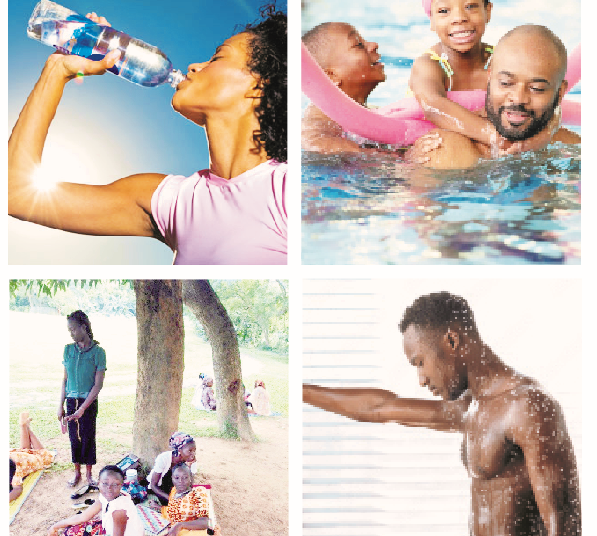With extreme heat already hitting the headlines this year, much like other natural disasters, heat waves can be very dangerous. While extreme cold is said to be also very dangerous, heat waves become life-threatening more quickly if proper precautions are not taken.
To help limit the impact of extreme heat, we have outlined very easy heat protection guidance that spells out what you should do to keep you and your family safe. The good news is that heat related impacts are preventable with knowledge, education and action.
During extreme heat, it is easy to become dehydrated or for your body to overheat.
Heat can cause serious and potentially fatal health problems such as heat exhaustion and heatstroke, trigger sudden events like heart attack or stroke, or worsen existing medical conditions like kidney or lung disease.
Extreme heat can affect anybody. Those more at-risk include people over the age of 65, babies and young children, pregnant women, people with acute or chronic health problems and people who are socially isolated.
Staying Safe In Extreme Heat
Prevent heat-related health problems by keeping cool and staying hydrated during hot weather. Plan ahead and check in with others.
Keep Cool:
Use air conditioning if available. The cost of air-conditioning can be reduced by using a fan at the same time, and increasing the thermostat temperature on your AC unit to 26-27˚C. Electric fans can help cool the body when the indoor temperature is below 39-40˚C. Keep your skin wet using a spray bottle or damp sponge. Soak a towel in cool tap water and wrap it loosely around your head. Take cool showers or foot baths with cool tap water.
Wrap ice cubes in a damp towel and drape around your neck.
Wear light and loose-fitting clothing.
Consider visiting an air-conditioned building such as a shopping centre or public library.
Use blinds or curtains to block sun from shining directly through windows. Open windows and doors if you think it is hotter indoors than outdoors.
Stay Hydrated:
During days when you are exposed to extreme heat, keep drinking water before you feel thirsty, especially if outdoors and performing physical activity. If your doctor has asked that you limit your fluid intake, ask them how much water you should drink during hot weather.
Whenever you leave home, always take a water bottle with you.
Watch for signs of dehydration like feeling thirsty, lightheaded, having a dry mouth, tiredness, having dark-coloured, strong-smelling urine or passing less urine than usual.
Plan Ahead:
During extreme heat, cancel or reschedule non-essential outings.
Plan essential activities for the coolest part of the day. If you do have to go outside, take a water bottle with you, seek shade, and wear a hat and sunscreen for skin protection.
Keep up to date with weather forecasts and warnings – via TV or radio, check the Bureau of Meteorology heatwave forecast online or via their app, and subscribe to receive Heat health warnings . Make sure that food and medicines are stored at appropriate temperatures. See your doctor to check if changes are needed to your medicines during extreme heat.
Power failures can happen during times of extreme heat – ensure you have a torch, battery-operated radio, fully charged mobile phone or battery back-up, food items that don’t require refrigeration, medications, plenty of drinking water and other essential items. Have a cool-box available to store ice or cool packs with medications.
Look at the things you can do to make your home cooler such as installing reflecting coatings, insulation, external window awnings, shade cloths or external blinds, and planting trees to provide shade around the house.
Check In With Others:
A quick call can make a big difference. Let family, friends and neighbours know you are ok or check in with those at increased risk or who may need your support during days of extreme heat.
Older People And Extreme Heat
People over 65 years are more susceptible to heat-related health problems because their bodies are less able to adjust to changes in temperature. They are also more likely to have underlying medical conditions and be taking medication that may interfere with the body’s ability to regulate temperature.
Older people with medical conditions should review their care plan with their doctor to ensure that these conditions are well-controlled before the weather gets hot. Ask your doctor if you are at increased risk of heat-related health problems in hot weather. The doctor may advise that you adjust your fluid intake, avoid certain medications or adjust the dosage during periods of extreme heat.
Children And Extreme Heat
Babies and young children need special care during hot weather because they are less able to cope with changes in temperature:
Never leave babies or young children in cars. Other additional breast- or bottle-
Babies in strollers can be kept cool by covering the stroller with a moist muslin/cotton cloth, preferably with a battery-operated clip-on fan if available. Keep the covering wet with a spray bottle.
People Working Or Exercising Outdoors In Extreme Heat
Working and exercising in the heat elevates the risk of heat related-health problems. For people outdoors during hot weather:
Where possible, cancel outdoor work or heavy exercise or reschedule for a cooler day. Plan essential activities for the coolest part of the day. Rest breaks should be taken more often and for longer when possible. Shade and any natural air movement should be provided where possible. Outdoor misting fans, if available, can reduce air temperature and help cool the body.
Always stay hydrated – Drink at least half a litre of fluids in the two hours before exercising. During your exercise, aim to drink about 200ml every 20 minutes or so.





